Close UP
Cross-Cultural Club "DANRO" ~The Warm Multicultural Atmosphere in Machida Spreads from DANRO~
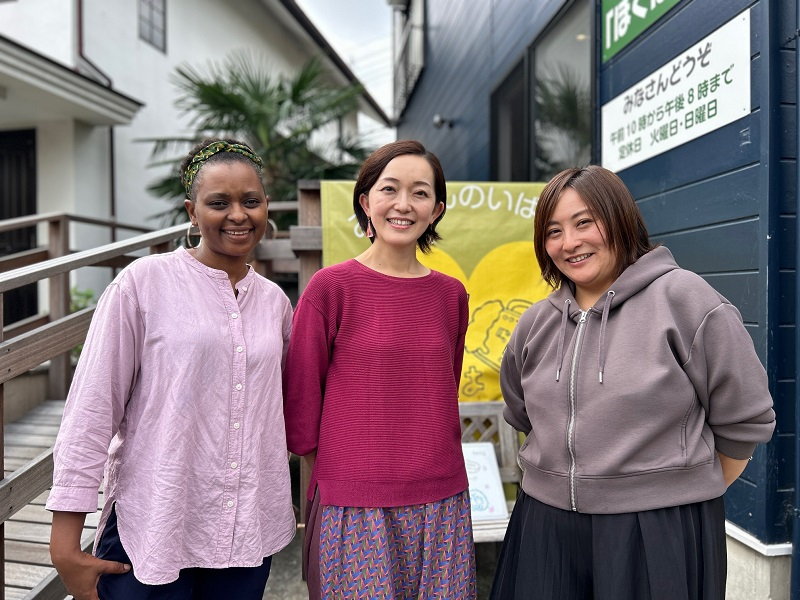
The Cross-Cultural Club "DANRO" is a gathering of parents, including those with foreign roots, in Machida City, who enjoy raising children together in the community. The members of DANRO are engaged in a variety of activities that leverage their respective cultures and capabilities. They say that while expanding the circle of multicultural coexistence in Machida, they aim to create a considerate and warm community where everyone feels "glad to live in Machida". We spoke with Ms. Mami Nishida, Ms. Lucy Kosugi, and Ms. Yu Onuki about DANRO, where mothers and fathers are working actively and energetically.
The impetus for DANRO's activities came from Lucy-san's words.
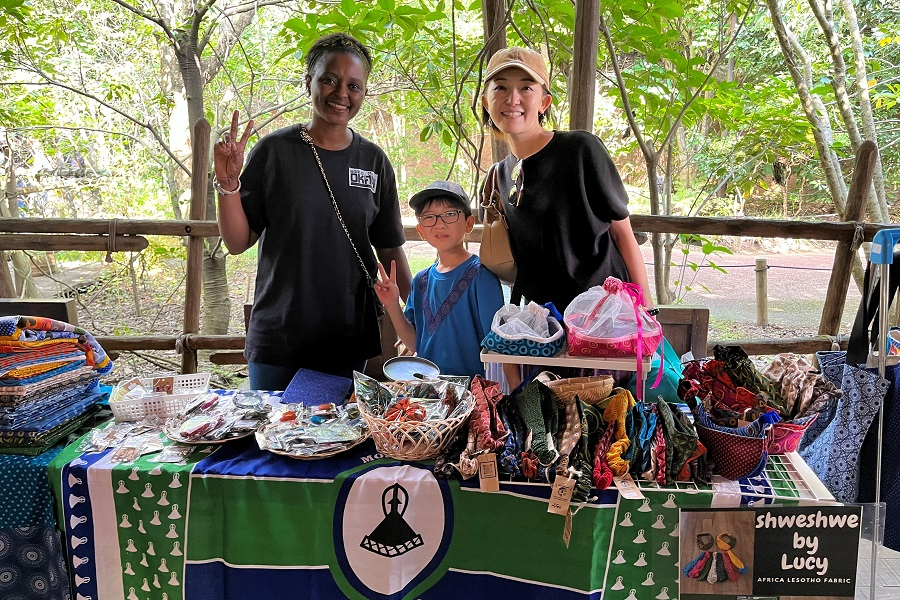
Photo Courtesy: Cross-Cultural Club DANRO
DANRO, which operates in Machida City, has participants from diverse national origins, including the United States, Canada, the United Kingdom, China, Australia, Indonesia, Bangladesh, Thailand, the Philippines, and the Kingdom of Lesotho.
DANRO's activities began with a question that Ms. Mami Nishida, a representative of DANRO, and Lucy-san - who came to Japan from the Kingdom of Lesotho in Africa - had. The two, whose children were close in age, met at a local childcare cafe and enjoyed parenting together while interacting as mom friends.
"One day, Lucy said, 'I wonder how other foreign mothers and fathers raise their children, and I wish I could find a friend with whom I could learn Japanese culture and language together.' As it turned out, we did not see any foreign mothers or fathers at the child-care cafes or child-care support centers. We wondered if foreign mothers and fathers were making the most of local child-rearing services," says Ms. Nishida.
At the time, there were not enough places in the Machida area where foreign mothers and fathers raising children could feel safe to participate in activities. Lucy-san and Ms. Nishida discussed the idea of doing something independently and called on other mothers and fathers of the same generation to join them in launching DANRO, in 2020.
"The name DANRO comes from a picture book titled Danro no mae de (In Front of the Fireplace). It is a story about various animals gathering in front of a warm fireplace, talking, becoming energized, and going outside. (The name DANRO) reflects our desire to create a place where people with diverse roots can talk together in a fun and safe environment," says Ms. Nishida.
A place where mothers and fathers can enjoy raising children together regardless of differences and cultural barriers.
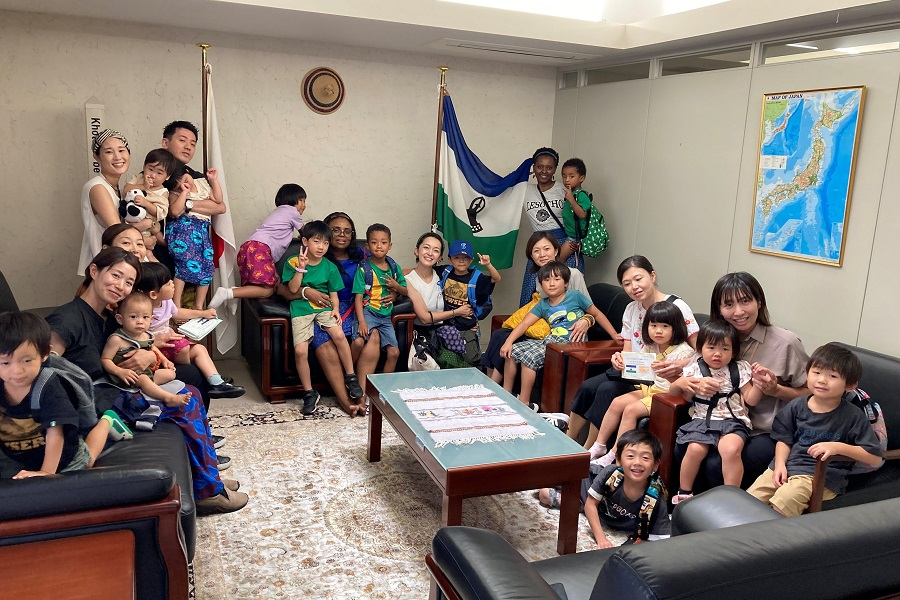
Photo Courtesy: Cross-Cultural Club DANRO
Ms. Nishida and Lucy-san approached their friends and foreign mothers they met at kindergartens, parks, etc., and gradually expanded their circle of activities. "Many mothers and fathers participate in DANRO. I think it is one of DANRO's strengths that we, who are in the same position of child-rearing, can share our concerns about parenting and read kindergarten and school handouts together," says Ms. Nishida.
DANRO's activities are divided into three main categories: "OYAKO (parents and children) Club," "Japanese (language) Club," and "working together."
The OYAKO Club meets once a month on a weekday during the daytime. Participants enjoy reading picture books, singing, celebrating seasonal events, and eating lunch together. During the children's long school vacations, they sometimes go on field trips. OYAKO Club activities allow participants to learn about and enjoy various national and seasonal festivals, such as Easter, Halloween, and Chinese New Year.
In the first DANRO activity, Lucy-san introduced her home country; the Kingdom of Lesotho. In 2022, the DANRO members and children visited its embassy during the summer school vacation. The event was made possible because Lucy-san was acquainted with the ambassador, then. The Ambassador made jellies and waited for the children, many of whom listened to stories about the Kingdom of Lesotho. Since there was a flute player among the Japanese members of DANRO, they played the national anthem of the Kingdom of Lesotho, and a Japanese piece called "Furusato (Hometown)". In return, the embassy staff performed a dance from the Kingdom of Lesotho. Ms. Nishida recalls, "We could feel the warm character of the Kingdom of Lesotho, which is willing to accept children and to raise them together with everyone."
Learning Japanese in a Relaxed Environment at the Japanese Club
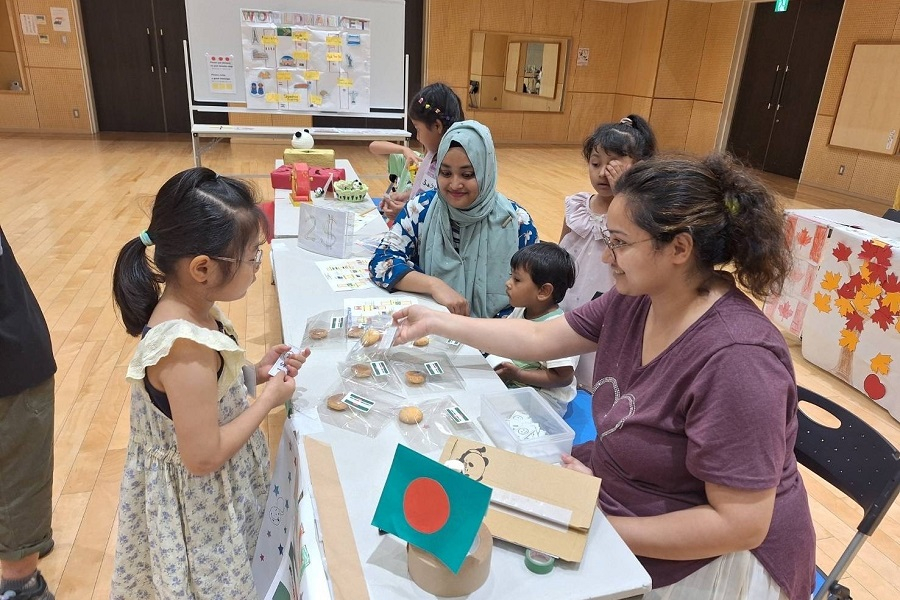
Photo Courtesy: Cross-Cultural Club DANRO
The Japanese Club is held once a month on weekends. It takes place at the facility of Le Marni, a non-profit organization where Ms. Onuki works, that provides after-school daycare services and other services. "(The daycare center is) a place where both adults and children can relax, with toys and other items. I think the location is also very important for this kind of activity, so we are grateful to have access to a space where everyone can feel safe," says Ms. Nishida.
The Japanese Club is also attended by a member who is a Japanese language teacher. Rather than being teachers or learners, DANRO's goal is to expand communication in Japanese while enjoying chatting with others in a considerate manner. "We try to make (participants) feel relaxed by talking about Japanese culture and life in Japan, reading picture books, and so on," says Ms. Onuki.
Depending on the country of origin, some people may not be able to participate in these events unless a wife and husband attend together. Others may be concerned about their Japanese proficiency level. Holding the event on weekends provides an opportunity for the whole family to participate and for families to get to know each other.
Many participants find out about DANRO's Japanese Club through word of mouth.
"We also publicize the event through SNSs and by placing flyers in supermarkets. It takes courage to go to (DANRO's events) for the first time. (Participants) often come with friends, or on the recommendation (of others)," says Ms. Nishida.
Finding a Role for Oneself at DANRO Outside of Work and Domestic Chores
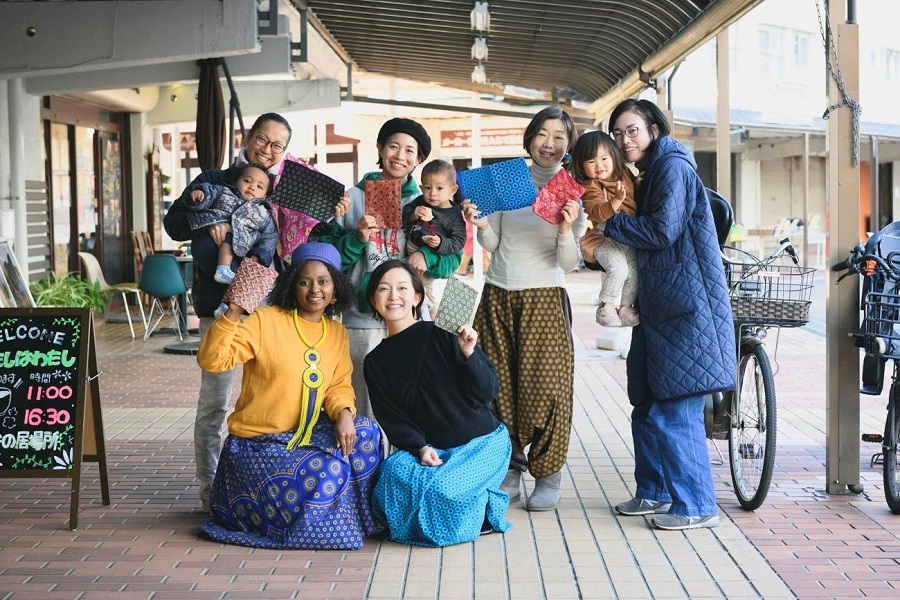
Photo Courtesy: Cross-Cultural Club DANRO
Ms. Nishida, a representative of DANRO, experienced child-rearing in New York for four years from 2011 to 2015 due to her husband's job relocation. She wanted to make friends in that community and get involved in it by using her skills, so she started an activity of placing bookmarks made with origami, at local libraries. The activity evolved into volunteering to teach origami at libraries, elementary schools, and nursing homes, along with mothers who stayed in New York City for their husbands' work.
"I realized that by playing my role in that community, I could make friends, be fulfilled, and live a life with peace of mind. This is the origin of DANRO's activities. We want to work together to create a place where mothers and fathers who gather at DANRO can utilize their culture and strengths to play an active role. If you have something you want to do in your community, everyone at DANRO would like to help," says Ms. Nishida.
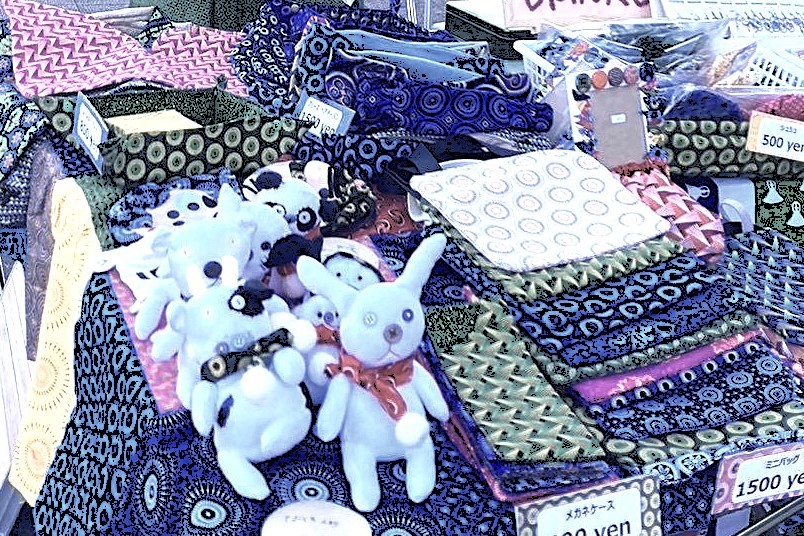
Photo Courtesy: Cross-Cultural Club DANRO
These thoughts led to DANRO's third activity, "working together." One of the most popular activities is a workshop for making small items using Shwe Shwe cloth from Lucy san's home country of Lesotho. Shwe Shwe is made of 100% cotton with geometric patterns printed on it, and workshop participants make clothes, hair accessories, and small items. "Each ethnic group uses a different color. My ethnic group uses green," says Lucy-san.
Shwe Shwe's bright colors and unique patterns have attracted many people, and many mothers now sell their handmade creations at shopping street bazaars and various events.
"The other moms were moved by the stories Lucy-san told us about her country and the (Shwe Shwe) cloth. From there, we immediately began making small items, which we are now able to sell. Some mothers were able to start new activities after meeting Lucy-san. In addition to the appeal of the cloth itself, I think it is important that Lucy-san is in Machida, and that she is willing to spread Shwe Shwe and teach about it," says Ms. Nishida.
"I think (activities) such as creating handmade products can motivate busy moms to find roles and pleasures outside of childcare and work. I am happy that I can offer that (motivation to the mothers) at DANRO, and I also enjoy learning about elements of Japanese culture that are not available in Africa, such as origami. I get motivation from other moms," says Lucy-san.
Aiming to expand activities by joining hands with other organizations that share the same goal of "making Machida a better place to live".
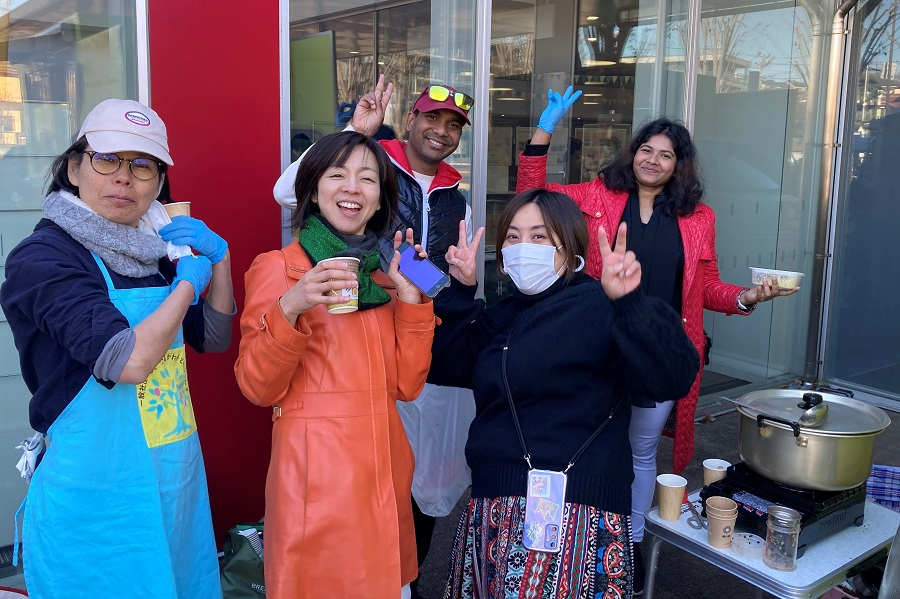
Photo Courtesy: Cross-Cultural Club DANRO
In addition, DANRO is expanding its activities day by day, including an English communication club organized by an American mother, as well as the opening of a stall at the Machida Citizens' Cooperative Festival which is called "Machi Cafe!". And other activities are expanding day by day.
"Since (DANRO) started participating in local events, we have made more connections with other organizations. I felt that community activities are difficult to connect to a larger force when we work individually, but by working together with people who share the same thoughts of wanting to make the city a better place, we can expand our activities," says Ms. Nishida.
Ms. Onuki says, "When I helped my friend with her (child's) school enrollment paperwork before, I felt that there must be many people who need this kind of help. But not everyone comes to us asking for help, and we don't yet have enough resources to help so many people. I hope that as DANRO's activities expand, the number of supporters will also increase, and more people will be able to enjoy life in Japan."
Ms. Nishida speaks of DANRO's prospects as follows. "In Japan, the skin color and hairstyle of children with foreign roots are still seen as uncommon, and other children sometimes make fun of them. But when we go to a foreign country, we might find ourselves unusual. I think there are many problems caused by 'not knowing'. DANRO's activities are now expanding to include mainly parents and children with roots in foreign countries. In the future, we would like to work together to gradually create a form of multicultural coexistence in Machida by creating events and programs for Japanese children and local residents to learn about multicultural coexistence."
The warm atmosphere created by DANRO will gently enfold the people of Machida.
*This article is based on information available at the time of the interview. For the latest information, please contact the organization directly.
